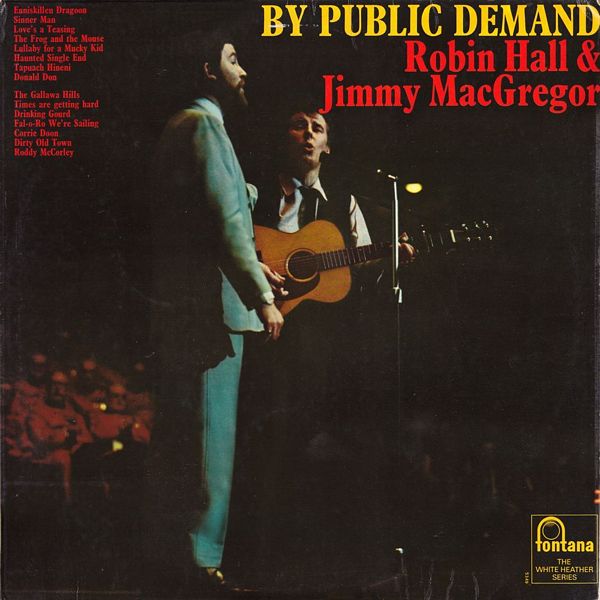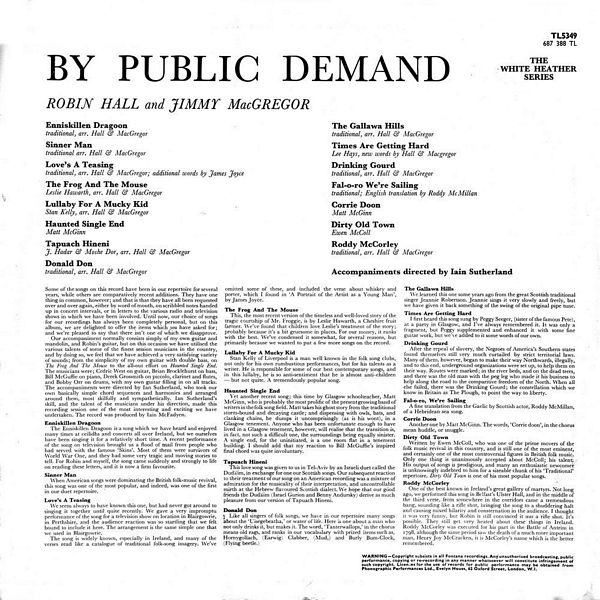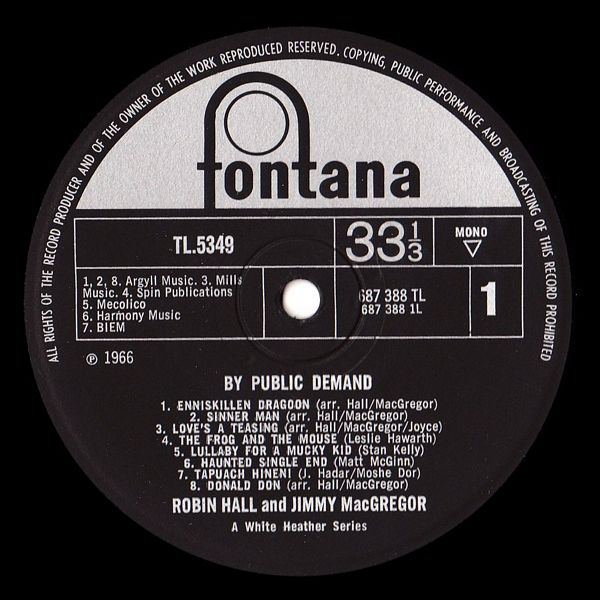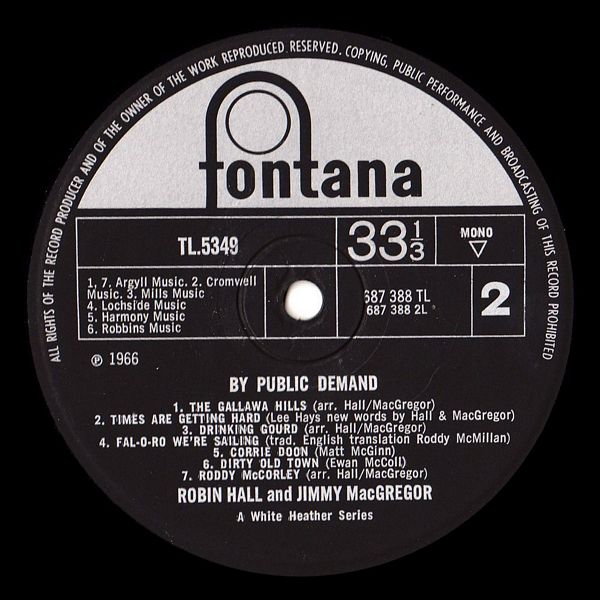

 |



|
Sleeve Notes
Some of the songs on this record have been in our repertoire for several years, while others are comparatively recent additions. They have one thing in common, however; and that is that they have all been requested over and over again, either by word of mouth, on scribbled notes handed up in concert intervals, or in letters to the various radio and television shows in which we have been involved. Until now, our choice of songs for our recordings has always been completely personal, but on this album, we are delighted to offer the items which you have asked for; and we're pleased to say that there isn't one of which we disapprove.
Our accompaniment normally consists simply of my own guitar and mandolin, and Robin's guitar, but on this occasion we have utilised the various talents of some of the finest session musicians in the country, and by doing so, we feel that we have achieved a very satisfying variety of sounds; from the simplicity of my own guitar with double bass, on The Frog And The Mouse to the all-out effort on Haunted Single End. The musicians were; Cedric West on guitar, Brian Brocklehurst on bass, Bill McGuffie on piano, Derek Grossmith on piccolo, clarinet and flutes, and Bobby Orr on drums, with my own guitar filling in on all tracks. The accompaniments were directed by Ian Sutherland, who took our own basically simple chord sequences and harmonies and arranged around them, most skillfully and sympathetically. Ian Sutherland's skill, and the talent of the musicians under his direction, made this recording session one of the most interesting and exciting we have undertaken. The record was produced by Iain McFadyen.
Enniskillen Dragoon — The Enniskillen Dragoon is a song which we have heard and enjoyed many times at ceilidhs and concerts all over Ireland, but we ourselves have been singing it for a relatively short time. A recent performance of the song on television brought us a flood of mail from people who had served with the famous 'Skins'. Most of them were survivors of World War One, and they had some very tragic and moving stories to tell. For Robin and myself, the song came suddenly and strongly to life on reading these letters, and it is now a firm favourite.
Sinner Man — When American songs were dominating the British folk-music revival, this song was one of the most popular, and indeed, was one of the first in our duet repertoire.
Love's A Teasing — We seem always to have known this one, but had never got around to singing it together until quite recently. We gave a very impromptu performance of the song for a television show on location in Blairgowrie, in Perthshire, and the audience reaction was so startling that we felt bound to include it here. The arrangement is the same simple one that we used in Blairgowrie.
The song is widely known, especially in Ireland, and many of the verses read like a catalogue of traditional folk-song imagery. We've omitted some of these, and included the verse about whiskey and porter, which I found in 'A Portrait of the Artist as a Young Man', by James Joyce.
The Frog And The Mouse — This, the most recent version of the timeless and well-loved story of the tragic courtship of Mr. Froggie, is by Leslie Hawarth, a Cheshire fruit farmer. We've found that children love Leslie's treatment of the story; probably because it's a bit gruesome in places. For our money, it ranks with the best. We've condensed it somewhat, for several reasons, but primarily because we wanted to put a few more songs on the record.
Lullaby For A Mucky Kid — Stan Kelly of Liverpool is a man well known in the folk song clubs, not only for his own rumbustious performances, but for his talents as a writer. He is responsible for some of our best contemporary songs, and in this lullaby, he is so anti-sentiment that he is almost anti-children — but not quite. A tremendously popular song.
Haunted Single End — Yet another recent song; this time by Glasgow schoolteacher, Matt McGinn, who is probably the most prolific of the presentgrowing band of writers in the folk song field. Matt takes his ghost story from the traditional storm-bound and decaying castle; and dispensing with owls, bats, and clanking chains, he dumps it uncomprisingly (as is his wont), in a Glasgow tenement. Anyone who has been unfortunate enough to have lived in a Glasgow tenement, however, will realise that the transition is, in fact, not such a difficult one, the surroundings being equally sinister. A single end, for the uninitiated, is a one room flat in a tenement building. I should add that my reaction to Bill McGuffie's inspired final chord was quite involuntary.
Tapuach Hineni — This love song was given to us in Tel-Aviv by an Israeli duet called the Dudaim, in exchange for one our Scottish songs. Our subsequent reaction to their treatment of our song on an American recording was a mixture of admiration for the musicality of their interpretation, and uncontrollable mirth at the Hebrew flavoured Scottish dialect. We hope that our good friends the Dudaim (Israel Gurion and Benny Andursky) derive as much pleasure from our version of Tapuach Hineni.
Donald Don — Like all singers of folk songs, we have in our repertoire many songs about the 'Uisegebeatha,' or water of life. Here is one about a man who not only drinks it, but makes it. The word, 'Tanterwallops,' in the chorus means old rags, and ranks in our vocabulary with prized items such as. Homygollach, (Earwig) Clabber, (Mud,) and Burly Bum-Clock, (Flying beetle. The Gallawa Hills
We learned this one some years ago from the great Scottish traditional singer Jeannie Robertson. Jeannie sings it very slowly and freely, but we have given it back something of the swing of the original pipe tune.
Times Are Getting Hard — I first heard this song sung by Peggy Seeger, (sister of the famous Pete), at a party in Glasgow, and I've always remembered it. It was only a fragment, but Peggy supplemented and enhanced it with some fine guitar work, but we've added to it some words of our own.
Drinking Gourd — After the repeal of slavery, the Negroes of America's Southern states found themselves still very much curtailed by strict territorial laws. Many of them, however, began to make their way Northwards, illegally, and to this end, underground organizations were set up, to help them on their way. Routes were marked; in the river beds, and on the dead trees, and there was the old man with the peg leg who made it his business to help along the road to the comparitive freedom of the North. When all else failed, there was the Drinking Gourd; the constellation which we know in Britain as The Plough, to point the way to liberty.
Fal-o-ro, We're Sailing — A fine translation from the Gaelic by Scottish actor, Roddy McMillan, of a Hebridean sea song.
Corrie Doon — Another one by Matt McGinn. The words, 'Corrie doon', in the chorus mean huddle, or snuggle.
Dirty Old Town — Written by Ewen McColl, who was one of the prime movers of the folk music revival in this country, and is still one of the most eminent, and certainly one of the most controversial figures in British folk music. Only one thing is unanimously accepted about McColl; his talent. His output of songs is prodigious, and many an enthusiastic newcomer is unknowingly indebted to him for a sizeable chunk of his 'Traditional' repertoire. Dirty Old Town is one of his most popular songs.
Roddy McCorley — One of the best known in Ireland's great gallery of martyrs. Not long ago, we performed this song in Belfast's Ulster Hall, and in the middle of the third verse, from somewhere in the corridors came a tremendous bang, sounding like a rifle shot, bringing the song to a shuddering halt and causing mixed hilarity and consternation in the audience. I thought it was very funny, but Robin is still convinced it was a rifle shot. It's possible. They still get very heated about these things in Ireland. Roddy McCorley was executed for his part in the Battle of Antrim in 1798, although the same period saw the death of a much more important man. Henry Joy McCracken, it is McCorley's name which is the better remembered.